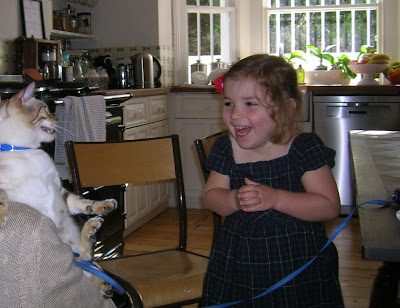"Anything you can do," Annie proclaims trenchantly, "I can do better. I can do anything better than you!"
Would you like to give yourself the treat of hearing it again? Then click here.

The reverse was true in the case of hurricane 'Katia'. Having vented the full force of her exuberance on the east coast of the Unites States, she arrived here in chastened mood. Nonetheless, she retained enough vitality to cause considerable damage, and was still whipping through the trees last week when I took Chloe for a walk.

Our communal garden is blessed with eight magnificent horse-chestnuts. At this time of the year they normally produce a modest harvest of small conkers, treasure for the children and food for the squirrels.
As we made our way down the windswept path, we were amazed to find ourselves literally bombarded with flying missiles . . . large and potent flying missiles!
Whipped from the branches by the strength of the gale, the conkers were hurtling out of the trees . . . outsize conkers, the like and size of which I'd never seen before.
 Luckily, neither Chloe nor I suffered a direct hit, but it was a near thing. If you look at this photo you'll see Chloe anxiously anticipating yet another bombardment from these newly hostile trees!
Luckily, neither Chloe nor I suffered a direct hit, but it was a near thing. If you look at this photo you'll see Chloe anxiously anticipating yet another bombardment from these newly hostile trees!But the chestnuts aren't alone in behaving strangely. The other day a friend told me of the unexpected behaviour of her climbing rose, an Albertine. Normally this species flowers once a year in June. This August, to my friend's surprise, her rose had a totally unexpected second flowering.
"Albertines don't do that," she protested, more in perplexity than pleasure.
In our man-made world everything is getting bigger and moving faster. The only thing that seems to be shrinking is our patience.
 Forgetting the pleasures of anticipation, we want everything now. Why wait until the summer for the strawberries? We want them for Christmas!
Forgetting the pleasures of anticipation, we want everything now. Why wait until the summer for the strawberries? We want them for Christmas!Could the natural world have been infected by our greed and impatience? Last week I had a shock. There, nestling amongst the fallen leaves was something I had never expected to see in September . . . a large clump of primroses in full flower.
"Anything you can do," sang Annie, "I can do better . . . "
Please, beloved planet, don't emulate the bad example of the bloated and competitive human race.
I, for one, don't crave a mid-summer snowdrop!






 It isn't fair to share grumbles with you, the purpose of these letters is to give you a laugh. But even if, strictly speaking, this isn't a laughing matter, may I download a growing concern, a sense of sadness?
It isn't fair to share grumbles with you, the purpose of these letters is to give you a laugh. But even if, strictly speaking, this isn't a laughing matter, may I download a growing concern, a sense of sadness?



